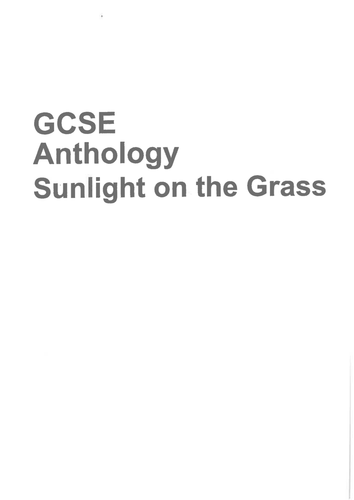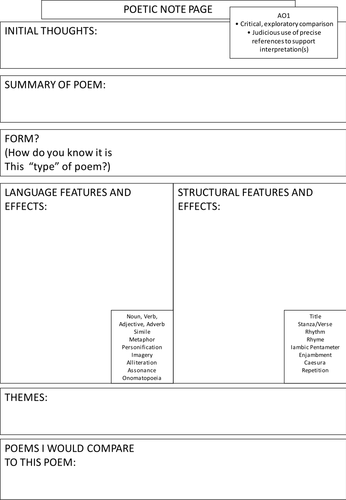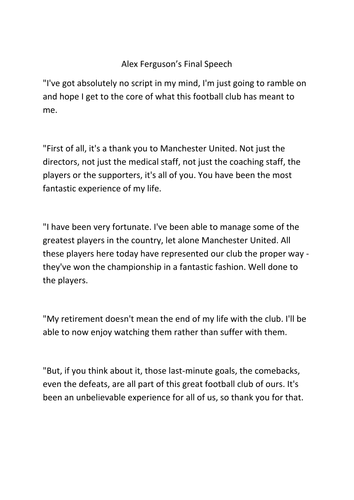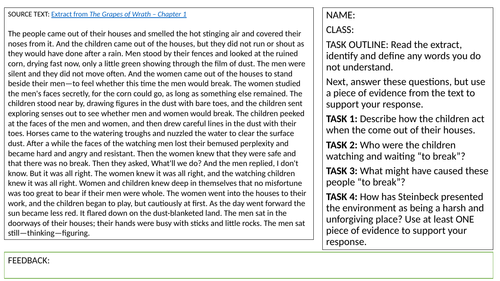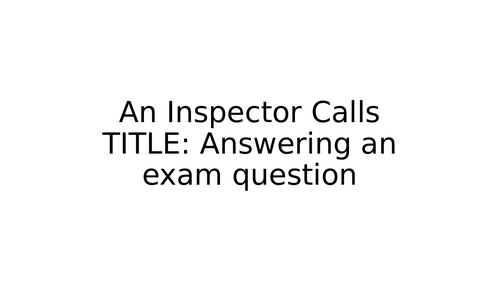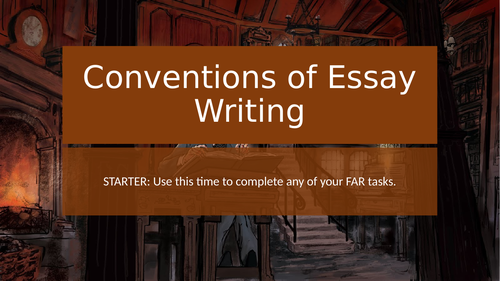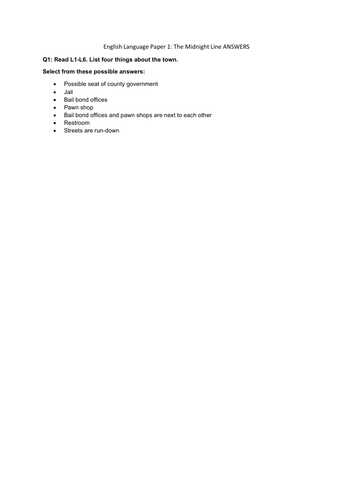
228Uploads
564k+Views
1398k+Downloads
All resources
Sale

AQA English Language Data Collation Spreadsheet aka "The Machine"
Attached is a spreadsheet that does an awful lot of work for you. To summarise, it does the following:
Allows for easy collation of GCSE Language marks on a paper by paper basis AND as a whole examination
Allows for easy identification of various student demagraphics - EAL, PP and so on
Allows you to measure progress against students best, average and last marks across both papers
Works out "how many marks" until you hit target grades for individual students
Colour codes grades and marks to allow for at a glance progress checks
Once you buy this spreadsheet, you will not need to get another LANGUAGE spreadsheet. The document contains instructions on the ARRAY tab as to how to update .
Oh, and if you do get this, I suggest you LOCK the individual spreadsheets ASAP: the document is set up to allow you to do this and still enter the data, you just won't be able to accidentally delete any of the coding, thus removing any brain overloads that might ensue.
I am using this at my current school and there are several other schools who are using this system with good reports.
Happy spread-sheeting!
PS - Yes, there is a page that reads exactly the same but for a version that caters for the AQA Literature course. The spreadsheets are different. Here's the link/address to the LITERATURE version:
https://www.tes.com/teaching-resource/aqa-english-literature-data-collation-spreadsheet-aka-the-machine-11405407
Sale

Sunlight on the Grass Revision Booklet
I designed this for the old AQA specification. Now that the spec is obsolete, some of you might be thinking of turning those stacks and stacks of anthologies into resources for KS3 classes (we certainly are for year 9). As a result, you may find this booklet useful.
The booklet is essentially a copy of the entire anthology where on the left hand side of a double page spread you have the text, and on the right hand side you have space for notes. Each story is ended with generic questions and has TWO exam questions for revision purposes.
Perfect for planning lessons when you are taking an extended period of time off.
Happy reading.
Sale

Year 7 (KS3) Introduction to Poetry Unit of Work
A collection of resources I have used to introduce KS3 (specifically year 7) students to poetry with a view to them writing their own anthology, and exploring an unseen poem.
Sale

AQA Poetry Cluster 2 Revision Booklet - Power and Conflict Poetry
An 84 page long booklet that provides you with the following:
A thematic table
A section for each poem where you can find a copy of the poem, a notes page (complete with helpful guidance), generic revision and exam questions and a response page
A comparative table
A copy of the mark criteria
I have also included the documents I used to make this just in case you want to make a different version yourself.
Enjoy, and be poetic.
ALTERATION: I’ve updated the resource now - found one or two typos. Also, I’ve added in a grid that allows for a variety of themes to be “graded” in terms of how present a theme is: I’ve found this to be an engaging way of getting the students to compare. Finally, I’ve added a small section at the end about the different types of poetic forms.
Sale

Exploring Political Speeches (based around the old AQA English Language Spoken Language criteria)
I had SO much fun with this unit of work! It helped that the TA in my class went on to become a local MP for Labour (still is as far as I can tell...). Essentially, this series of 5 lessons - which, by the way, totally went over the 5 lessons I gave myself to teach this - explores a number of different political speeches. Included in the pack are a number of transcripts - Martin Luther King's "I have a dream" speech, Alex Ferguson's farewell speech, Bush's post-911 address to the nation and the transcripts of Clegg, Cameron and Brown from the First Televised General Election Debates (heavy stuff).
I was a little tentative at teaching this to a bottom set year 9 class, but they totally got on board with the debates (they tore shreds out of Brown...) and engaged well with the controlled assessment task at the end.
I know that the controlled assessments are now null and void (a shame really), but the exploration of speeches might be useful to someone out there in the teaching ether...
Sale

KS4: Creative Writing inspired by Saving Private Ryan
Material I generated for the old AQA style creative writing controlled assessments - it still resonates with the new AQA Paper 1 Section B style questions (inspired by images). You'll need a copy of the film and you'll need to alter the Learning Outcomes (they are all set against the old AQA English Language Coursework criteria).
Sale

Transitional Lesson: KS2 to KS3
One of my old schools did a great job of communicating with their feeder Primary Schools. We would be invited in to teach the incoming Year 7s. We took this a stage further by collaboratively teaching lessons with people from other departments. This lesson is designed to be taught to Year 6 students and combines Art and English. It's quite easy to change this to meet the needs of your own school's transitional needs.
You'll need to download some Manga style pictures and also, somewhat unsurprisingly, you'll need Art resources too.
Bundle Sale

Mass of KS3 resources
This is a collection of free and paid resources - simply put, every single SoW and mini-unit I have ever created for Key Stage 3. Enough in here to significantly add to a KS3 curriculum for a year group or two.
Sale

D6 Dungeons and Dragons: The Dark Forest (An Easter Mission Pack)
PREMISE: You’ve been summoned to the gates of the Dark Forest – a haunted woodland, home to numerous fell creatures and twisted forms. The forest shifts and twists constantly, making it impossible to map. However, you and your adventuring kin will step into this shadowy land as the fate of Easter rests upon your shoulders. The Easter Bunny has been possessed! You’re job is to find him and drive out the demon. It’s a tough job, but someone has to do it…
Ok, so I kind of got carried away the whole Dungeons and Dragons thing and went and made myself an Easter Mission Pack. Also, as I had such success using my Christmas one, it felt like the right thing to do.
I include a lot of literary characters and locations in this one too.Here's the full list:
Hagrid
Aragog
Voldemort
Dracula
Frankenstein's Monster
Willow (from Buffy)
Treebeard
The Watcher in the Water (From Lord of The Rings)
The Balrog
The Wall (from Game of Thrones)
The Ringwraiths
It all seems to fit together.
Also, I include in this pack a whole-class presentation so you can do a guided creative writing lesson with a class or a large group. Either way, I am really looking forward to teaching this.
You will need to encourage all Dungeon Masters to be creative in how they manage the conflict situations.
This, is going to be great fun to teach...
PS - with the whole class presentation, clicking the main background image acts as the link to the next slide via the "secret paths" without flagging it up to students.
PPS - I've also included the first lesson - available for free elsewhere - otherwise it gets a bit complicated.
Sale

KS3: SPaG Understanding a Text Lessons (Focusing on John Steinbeck)
Designed to be taught in support of a Year 9 class doing a GCSE-style task on Of Mice and Men. These powerpoints make good activities as part of a lesson, or they can be printed off as individual worksheets. The worksheet element contains a RAG rating system and some generic targets, suited for peer or self assessment.
Sale

AQA English Literature Power and Conflict Poetry: Random Comparative Question Generator
Does exactly what it says. This spreadsheet will create one random comparative question for and will generate a new one every time you double-click a cell and press enter. A word of caution in that you cannot retrieve the old question. But, this is very useful for revision and or cover lessons.
I’ve left room for you to add in your own question stems and you can manipulate the poetry lists too. I’ve left some instructions on the relevant tab.
Hope you find this useful.
Sale

AQA Power and Conflict BATTLE CARDS
As part of my quest to engage students with the 15 Power and Conflict poems, I’ve come up with these Battle Cards. Essentially, the idea is to promote AO1 and AO2 related discussions that get the students to recall what they know about the poems they have been taught without having the actual poem in front of them.
The students “score” each of the poem against a number of POWER and CONFLICT related areas. This is recorded on an A5 sized BATTLE CARD where they can draw supporting images(good for recall) and identify methods, key quotations and themes.
The idea is for students to battle one another and use the cards as the stimulus point for the discussion. Whoever is best able to justify the score they have given for their card wins the round.
I’ve included a blank card along with 15 poem specific cards (each of these has a supporting back ground image, but is the same as the blank card in all other respects).
Sale

AQA English Literature: Macbeth
A collection of resources designed to support the teaching of Macbeth at GCSE level. The lessons assume that the class will be “acting” out the play, using the summary as a stimulus for the acting out element. I interspersed this acting with numerous directions to read the text aloud; overall, the students enjoyed this combination of normal language and Shakespearean.
It has always been my way to establish an initial understanding of a Shakespearean text before trying to wade through the language.
Hopefully, this will prove a useful starting point.
Sale

AQA English Literature: An Inspector Calls essay building lesson
A lesson that models the process of building a high-end An Inspector Calls essay. Please note, the lesson assumes that the class has read the play and has attempted versions of the AQA English Literature questions already. Also, the lesson works best as an aspirational example: I concentrate on using sophisticated language to shape my points, and focus on integrating appropriate references. Please note I’ve deliberately left some academic “gaps” too - this model response is a high-quality response, but there are other avenues of academic insight that can be taken.
Bottom line, to get the most out of this lesson, you’ll need to spend a little time going through it all first - hence the low price.
Sale

AQA English Literature: Romeo and Juliet Method Focus Essay Builder
Similar to a lesson I posted on A Christmas Carol. After a bit of a warm-up, the crux of the lesson is focused on establishing concepts then explicitly showing students HOW to identify methods - again, some still confuse quotations and methods - before pointing them at an exam question.
UPDATE: I repeated this lesson a few weeks later with a different extract, but backing off a notch in terms of explicitly identifying methods.
Sale

AQA English Literature: A Christmas Carol Method Focus Essay Builder
My year 11s were STILL struggling with how to frame a method, so I came up with this stand alone lesson. The idea is that, having reviewed the slide where the methods are explicitly identified, the students will see that a method and a quotation are not the same thing.
This was a successful lesson.
UPDATE: I repeated this process with a bottom set year 10 class where I was even more specific. This was also a successful lesson, so I’ve included it.
Sale

AQA English Language Paper 1 Resources - based upon 100% Perfect Girl
A few things first: the mock exam can be found elsewhere on in my resources and I base the lessons off a similar series of lessons focused on Anil. The difference here is that these lessons are very much targeting higher ability students - all of the success criteria draws from the top end of the mark criteria.
I found this series of lessons to be really useful as a way of establishing the skills required to answer each of the Section A questions. The lessons focus less on exam strategy and more on understanding what is required in relation to each question. The kids found it useful.
Sale

AQA English Language P2: Section B (using A Christmas Carol)
A series of lessons designed to make sure students have a clear understanding of the “basics” and the “developed” skills and techniques required for EACH of the possible text types they could meet in Section B of the English Language Paper 2 exam. Because my lot were taught A Christmas Carol (and I was trying to kill two birds with one stone by revising this at the same time…), the tasks are all focused on writing within the world of Scrooge. To that end, they may require some editing on the part of the user - hence the reduced price.
Sale

AQA English Language Paper 1 MOCK EXAM: The Midnight Line (Jack Reacher)
I’ve used the opening chapter of the novel as the basis for an AQA Language Paper 1 mock exam. I’ve created an Answer paper too.


